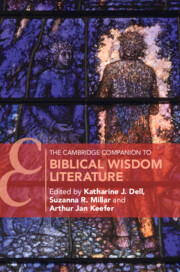Book contents
- The Cambridge Companion to Biblical Wisdom Literature
- Cambridge Companions to Religion
- The Cambridge Companion to Biblical Wisdom Literature
- Copyright page
- Contents
- Contributors
- Acknowledgement
- Abbreviations
- Part I The Context of Wisdom Literature
- Part II Wisdom Literature in the Hebrew Bible
- 8 Proverbs
- 9 Job
- 10 Ecclesiastes
- 11 The Song of Songs
- 12 Wisdom Psalms
- 13 Wisdom’s Wider Resonance
- Part III Wisdom Literature beyond the Hebrew Bible
- Part IV Themes in the Wisdom Literature
- Bibliography
- Index
- Cambridge Companions to Religion
- References
9 - Job
from Part II - Wisdom Literature in the Hebrew Bible
Published online by Cambridge University Press: 28 July 2022
- The Cambridge Companion to Biblical Wisdom Literature
- Cambridge Companions to Religion
- The Cambridge Companion to Biblical Wisdom Literature
- Copyright page
- Contents
- Contributors
- Acknowledgement
- Abbreviations
- Part I The Context of Wisdom Literature
- Part II Wisdom Literature in the Hebrew Bible
- 8 Proverbs
- 9 Job
- 10 Ecclesiastes
- 11 The Song of Songs
- 12 Wisdom Psalms
- 13 Wisdom’s Wider Resonance
- Part III Wisdom Literature beyond the Hebrew Bible
- Part IV Themes in the Wisdom Literature
- Bibliography
- Index
- Cambridge Companions to Religion
- References
Summary
Will Kynes introduces the book of Job by asking ‘What is the book of Job, and how does that affect how you read it?’ This question entails investigation into the book’s genre, for genre recognition provides a horizon of expectations which shape the reader’s perspective. Job has traditionally been read as Wisdom Literature, based on perceived similarities with Proverbs and Ecclesiastes in form, theme, and Sitz im Leben. However, this genre grouping leads to Job’s unwarranted separation from the rest of the canon, theological abstraction, and hermeneutical limitations. Job is an open and ambiguous text which might be placed in multiple genre groupings. Kynes surveys several of these (sifre emet, lament, exemplary sufferer texts, poetry, drama, controversy dialogue, history, epic, didactic narrative, Torah, prophecy, lawsuit, and apocalyptic), as well as some meta-generic readings (parody, citation, and polyphony). Given this diversity, and recognising that all readings are culturally contingent and only partially appropriate, he advocates a multiperspectival approach which draws insights from many directions.
- Type
- Chapter
- Information
- The Cambridge Companion to Biblical Wisdom Literature , pp. 162 - 183Publisher: Cambridge University PressPrint publication year: 2022

